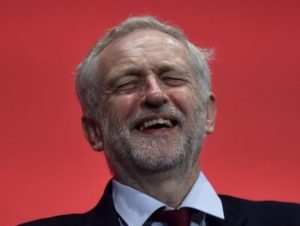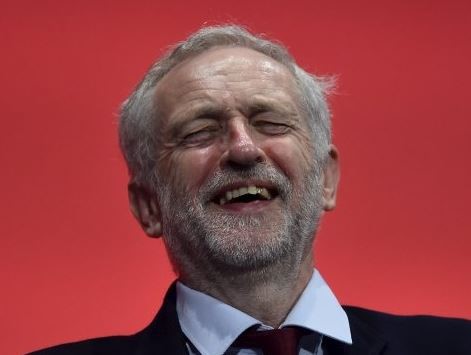28 February 2019
Having A Laugh
The Independent Group.
By J R Thomas
 Many viewers must have thought they had accidentally tuned into Sex and the City. Three glamorous ladies walking through Westminster, hair blowing in the breeze, heels clacking on the granite, laughing and smiling and joking together. Was it indeed a new British version of the popular soap, or had their joint Lotto ticket come up on a third rollover? Nope, neither of these; they had just resigned from the Conservative Party, and finally they could speak out.
Many viewers must have thought they had accidentally tuned into Sex and the City. Three glamorous ladies walking through Westminster, hair blowing in the breeze, heels clacking on the granite, laughing and smiling and joking together. Was it indeed a new British version of the popular soap, or had their joint Lotto ticket come up on a third rollover? Nope, neither of these; they had just resigned from the Conservative Party, and finally they could speak out.
As we have suggested in the Shaw Sheet several times in recent months, political life tends to run in cycles. Some matter of supposed or actual great principle comes up; the party (parties in this case) cannot agree on how to address the issues, much grumbling takes place behind the scenes and with “friends” (inevitably, talkative friends). Threats are made, politely. Then finally it all becomes unbearable, the disaffected ones resign, find a conference room in SW1, and start a new political party. Usually, pretty much always , the new grouping characterises itself as more moderate than anything else on offer, more in touch with the people’s needs and wishes, and most of all, fed up with the old ways of doing things and says that modern times need new approaches.
So it was in the C19th century, as various groupings of freetraders and Empire imperial protectionists split and re-joined, only to re-split. In the early 1930’s Sir Oswald Mosely, a Labour cabinet minister, thought the times had come for a modern form of politics (involving black shirts and marching). In 1942 another baronet, Sir Richard Acland, a Liberal MP, started a Common Wealth Party (note the subtlety of the name, this was Left leaning, not proto Imperialist). It failed after winning a couple of byelections, Acland re-emerging as a Labour MP in 1947. In 1981 some considerably more distinguished politicians, Jenkins, Williams, Owen, and Rogers, all former cabinet ministers, resigned from the Labour Party, complaining that the leadership was ineffectual and that the party had been infiltrated by militant left-wingers (don’t stop me if you think you have heard this one before). Their new party was the Social Democratic Party and it did not work out; though the “Democratic” bit does survive in the Liberal Democrats – at least in the title.
And here we go again. The new Independent Group proudly rises in all its glory. Eight Labour M.P’s and three Conservatives, splendidly united to bring to Britain moderation, centrism, new ways. Or perhaps: Moderation, Centrism, New Ways. In the form of? Through policies of what? And here the new ways crumble instantly to dust. The Independents will have to get back to you on that one. Not Toryism, obviously. Or Socialism. Or even Liberal Democratism, presumably, by their failure to join Vince and his minibus of LibDems.

The new Group does not appear to have spent much time debating key issues. It seems to be not so much for things, as against them. The ex-Labour eight are against Mr Corbyn and Momentum and all their far Left doings. They are united in their revulsion at Labour’s failure to deal with allegations of anti-Semitism. They are against constituency Labour Parties calling them to account and forcing them through reselection committees before the next election. And the Conservatives? They are against Mrs May, and also Mr Johnson, and also against constituency reselection, feeling this to be a profoundly un-Tory process. Or un-Independent process. Very sternly, all of them are very against the idea of resigning their parliamentary seats and putting their new found spirit of Independence to their local electorates. Could it be they are not that keen on democracy and listening to the people?
This leads us to something else which unites the Group. They are against Brexit. None of them have hidden this in the past, though the ex-Tories rather may have sown seeds of confusion by voting for the triggering of clause 50, and standing in the 2017 election on the Conservative manifesto without crossing sections of it out, and supporting Mrs May in the Commons in the recent vote of confidence. This is the one item of policy which could have appeared on the Independent manifesto, had they got around to writing one: their urge to Remain, not in their parties, but in Europe. But quite why this should lead them to give up their party whip at this particular point, is not very clear. Such is the breakdown of party discipline in the Commons they could have gone on taking their respective whips, and rebelling whenever it suited them. True, probably most of them would have been deselected from their seats sooner or later, and certainly before the next election. But they have merely done that themselves, and the chances are that as Independents they will all lose their seats at the next election anyway. For most of them that will be the end of their political careers. It is not as though any of them are exactly household names or rising stars in their parties.
On the ex-Tory side of the Group, Anna Soubry is the best known, a former junior minister, a Midlands MP of liberal leanings, certainly of more Cameron than Johnson orientation, and although known for her pro-Remain views not thought otherwise to be a natural rebel. Sarah Wollaston, a former general practitioner, MP for Totnes in Devon, seems to have been uncomfortable with many Conservative policies since she was elected in 2010. Perhaps it is not entirely irrelevant to her political stances that she was chosen by a postal vote of all voters in her constituency – an open primary as used in some American states (another democratic innovation Conservatives can thank David Cameron for). The third member of the trio is Heidi Allen, a Cambridgeshire MP, of whom a Tory Party wit once said that she did not seem altogether sure which party she was a member of, let alone what its policies were.
The Labour group also is not impressively heavyweight; the leading light is Chuka Umunna, MP for a safe London seat who has held senior shadow cabinet positions and is a former City of London solicitor. But the one attracting most publicity is perhaps Luciana Berger, who has had a very difficult relationship with the Labour Party in her Liverpool seat, and has received much anti-Semitic abuse. She is from a North London Jewish family and was accused of being imposed on her constituency party and certainly has been unable to repair her party relationships in the north west. Apart from Mr Umunna, none of the group who resigned were thought likely to achieve conspicuous success in their old party, certainly under its current leadership.
Maybe we are at a point of a complete realignment of UK politics, as after the First World War, and soon the Independents will be overwhelmed with Commons applicants to join them. But if not, and if they know their history, and understand the effects of the British electoral system on small political parties, the Group will know that their gesture, whilst brave and enjoyable, (the Tory ladies certainly seemed to enjoy putting the boot into their former leaders and colleagues) is in the end, probably futile. Of those rebels who made dramatic exits in the past, the only ones to survive politically were those who rejoined a mainstream party (not always the one they left). It is often said of the House of Commons that your opponents are in front of you, but your enemies are behind you. If you are newly Independent, you have put your enemies all around you. That’s not a comfortable thought.


